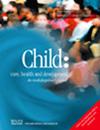Improving Parent and Therapist Experiences of Codelivering Intensive Upper Limb Interventions for Children With Hemiplegia: A Qualitative Study Using the Theoretical Domains Framework
Abstract
Background
Partnership working between parents and therapists is a key component of family-centred care (FCC). Such partnerships in paediatric intervention delivery can help achieve required levels of dosage, intensity and embed interventions in the child's everyday activities. This study explores the experience and views of parents and therapists codelivering an intensive upper limb intervention programme for children with hemiplegia, to find ways to enhance successful partnership working.
Methods
Semistructured interviews were conducted with 12 parents and 8 therapists (3 hospital-based and 5 community-based). To help make evidence-based recommendations, data were analysed using inductive reflexive analysis and mapped to the Theoretical Domains Framework (TDF) of constructs that are common determinants of clinical behaviours or practices.
Results
Five major themes were identified as follows: (1) realities of accessing intensive intervention, (2) key components of intervention delivery, (3) role of goal setting, (4) importance of partnership and (5) impact of intervention delivery on parents. Our findings showed that overall parents valued involvement in the programme, acknowledging benefits and challenges, as well as aspects in which they needed further support. Hospital therapists identified various education and training needs to improve their capabilities to coach parents and to collaboratively set meaningful goals. Community therapists valued the opportunity to develop their skills in intensive intervention and were keen to see evidence-based interventions offered in the community.
Conclusions
It is possible for parents, hospital therapists and community therapists to codeliver intensive upper limb intervention programmes to children with hemiplegia. However, it is important to create a flexible programme which clearly acknowledges the roles, skills and unique contributions of parents and therapists which is conducive to truly equal partnership working in appropriate settings.


 求助内容:
求助内容: 应助结果提醒方式:
应助结果提醒方式:


